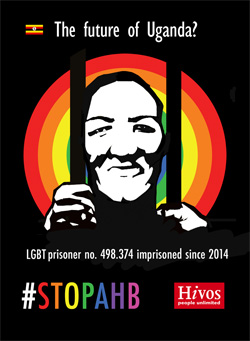By Sarah Robbins
On February 24, Ugandan President Yoweri Museveni signed an anti-homosexuality bill into law that punishes same-sex sexual behavior with life in prison and outlaws the “promotion of homosexuality,” a category that could be interpreted to include providing GMT with HIV outreach and services. In the days immediately following the law’s enactment, organizations providing HIV and other health services to GMT, including amfAR grantee partner Spectrum Uganda, shut their doors due to concerns about client and staff safety, and a major Ugandan tabloid published a list of “Uganda’s 200 Top Homos,” further increasing fears of attacks and arrests. amfAR spoke with LGBT activist John Wambere, operations coordinator at Spectrum Uganda, about what the law will mean for LGBT Ugandans and what the international community can do to support them and their fight to overturn the bill.
amfAR: Has there been an increase in violence towards LGBT? How about an increase in arrests?
.jpg) John Wambere works as operations coordinator for amfAR grantee-partner Spectrum UgandaJohn: There has been a lot, a lot, a lot. First of all, even before Parliament passed the bill [in December], we had an increase in arrests. People were being arrested and humiliated on TV. Many were forced to undress, were forced to get HIV checkups. Police were searching homes for evidence, berating people. It was very, very, very bad.
John Wambere works as operations coordinator for amfAR grantee-partner Spectrum UgandaJohn: There has been a lot, a lot, a lot. First of all, even before Parliament passed the bill [in December], we had an increase in arrests. People were being arrested and humiliated on TV. Many were forced to undress, were forced to get HIV checkups. Police were searching homes for evidence, berating people. It was very, very, very bad.
Now threats have increased even more. Some people have been attacked in public places, like in taxi parks and markets. Attacks have also increased in neighborhoods. The boda boda [motorcycle taxi] drivers are attacking residents. People are staying indoors. When your name is in the newspapers, what are you going to do? People cannot work, so they are going hungry. Very soon we are going to hear that people are breaking down mentally and that they are starting to die of HIV or drug use. HIV deaths are going to increase.
amfAR: How will the anti-homosexuality bill impact the GMT community’s ability to access HIV services?
John: When the government of Uganda put the bill into place, the Minister of Health declared that gays will not be denied access to health services, but what happens if you are perceived or known to be gay? How am I supposed to be convinced to go to a clinic when my face was in the papers as a homosexual? You think I am going to take public transport to the public hospital of Mulago without being lynched?
Spectrum Uganda has over fifty healthcare providers within Kampala. We used to hold meetings where GMT openly discussed living with HIV. Now these people are going to get arrested and killed if they are open. How will the government ensure that GMT going to the clinic to get HIV treatment will be safe? But sex is going to continue—just without access to lubricants or condoms. The impact is very big.
 The new law punishes homosexuality with life in prison.amfAR: What should the international community do to help the LGBT community in Uganda?
The new law punishes homosexuality with life in prison.amfAR: What should the international community do to help the LGBT community in Uganda?
John: This time, Museveni seemed to be stuck in the middle of two things: pressure from the international community and his desire to stay in power. So, maybe he signed the bill to prove to the Western world that we can be who we are and you don’t make decisions and you don’t give me orders.
I think this has caused the international community to reconsider what options they have. Currently, they can help with three specific things. They can help those who are seeking asylum. Second, they can ensure that organizations remain open, so people who are diagnosed with HIV can continue to receive treatment. If you close offices, people lose help and hope. Lastly, cut aid [to the Ugandan government] and divert the money to civil society organizations.
amfAR: It seems likely that Museveni will run for re-election in 2016. How do you think the signing of this law will impact his campaign?
John: President Museveni signed the anti-homosexuality bill because it was popular and the majority wanted it, but I do not think any research was carried out about who claims to support the bill. Politicians and religious leaders pushed the agenda, but if you went out to Ugandans and interviewed them, they would say we do not like homosexuals and we do not support it, but it is not our main problem. What does homosexuality have to do with my poverty, my ability to access treatment, or the economy? If you go out to the village and ask someone, what is your problem, most of them would say, lack of drugs in hospitals or other things like that. If you ask, what is society’s problem, most people would say drunkards or those who smoke marijuana. The issue of homosexuality would be a very small problem. So I think if the Ugandan opposition properly mobilizes itself, there is a possibility of President Museveni losing.